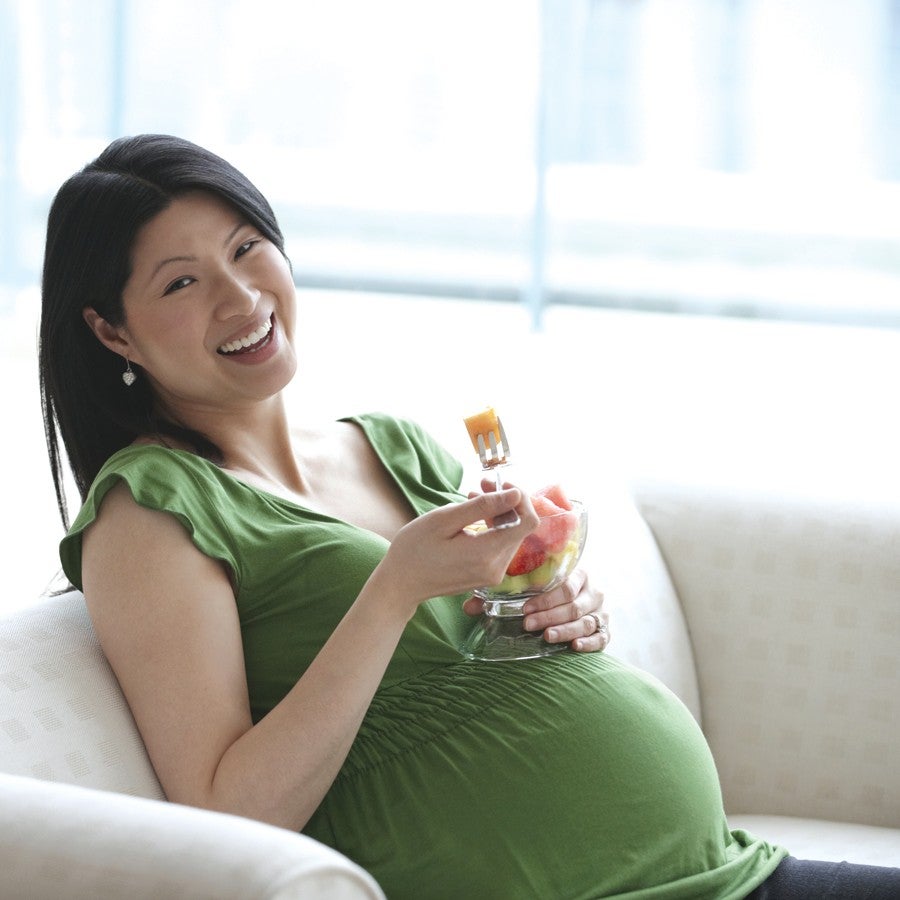Eating for Two?


Q: What do I need to know to ensure that I am eating nutritiously before and during my pregnancy, and while breast-feeding?
A: Pregnancy and breast-feeding are times when you want your nutrition to be the best it can be. But it’s also a time when you’ll get all kinds of well-meaning but conflicting advice about how to go about it. Here’s what you need to know:
BEFORE YOU GET PREGNANT Folate is a B vitamin that helps protect against certain birth defects. You’ll find it in green leafy vegetables, beans, and enriched products (some breads, pastas, and cereals), as well as in all common multiple vitamins. You’ll want to be sure folate-rich foods are in your routine before you conceive. To avoid mercury and other toxins that can harm your baby, many authorities also recommend avoiding tuna, shark, swordfish, king mackerel, and tilefish. If you’re on a plant-based diet, you’ve already covered these bases.
DURING PREGNANCY Yes, you’re eating for two. But one of you is very small, so you really do not need a huge amount of extra food. Pregnant women need about 300 calories per day over and above their normal intake, which is about a cup and a half of rice, a cup of chickpeas, or three medium apples. Pregnancy is not a time to skimp on food, a lesson learned from the Dutch famine during World War II when foods were so strictly rationed that the population was all but starving. Women who were in the early stages of pregnancy during this time gave birth to children who grew up to have a higher risk of weight problems and heart disease, compared to people who were better nourished during fetal growth. Aspects of the baby’s biochemistry appear to be programmed before birth, so having adequate nutrition is critical during this time.
What’s good weight gain? About 25 to 35 pounds is reasonable—a bit more if you’re underweight and less if you’re overweight. What about protein, iron, and other nutrients of concern? Plant-based diets provide plenty of protein, even without any special combining or “food complementing.” This is also true in pregnancy. The natural increase in food intake will give you the protein you need. You need extra iron, mainly in the second half of pregnancy, so green leafy vegetables and beans are foods to favor. Some women do fine getting their iron entirely from food sources, along with whatever iron they have stored up already; others need an iron supplement (usually about 30 milligrams per day, with more for women who are large, anemic, or pregnant with twins). Your doctor can easily test your iron status at the beginning and middle of pregnancy to see if you need extra amounts. There is no need to add meat or other animal products for iron, and you are better off without them.
You do need vitamin B12 for healthy nerves and healthy blood, and the most reliable source is a prenatal vitamin. Do not count on spirulina or miso to provide enough vitamin B12. What about omega-3s,the “good fats” that are required for healthy development of the brain and nervous system? Many plant-based foods, especially flax, walnuts, soybeans, and soy products, are rich in alpha-linolenic acid, a basic omega-3 fat that converts to other omega-3s, including EPA (eicosapentaenoic acid) and DHA (docosahexaenoic acid). Questioning whether this conversion process is rapid enough to supply the full range of omega-3s the body needs, some have pushed fish oil, which contains preformed EPA and DHA. However, studies so far suggest that fish oil is not at all necessary. First, a recent Australian study published in the Journal of the American Medical Association showed that participants’ daily intake of a DHA-rich fish oil supplement during pregnancy offered no detectable cognitive benefits for their children when evaluated at 18 months. Second, the European Prospective Investigation into Cancer and Nutrition study showed that women following entirely plant-based diets tend to have more omega-3s in their blood, compared with meat-eating and fish-eating women.
Women who want to hedge their bets can find plant-derived DHA supplements at any health food store and also online. Studies on caffeine have given mixed results, but the best evidence—from a study of 1,063 women in the San Francisco Bay area—indicates that caffeine, even the amount in one or two cups of coffee daily, may increase the possibility of miscarriage. As for alcohol, avoid it, period.
WHILE BREAST-FEEDING Breast-feeding is a real gift for both mother and child. For mom, it saves the time, expense, and inconvenience of formula feedings. For baby, breast-feeding reduces the risk of obesity, diabetes, and other health problems later in life. Because your body is making breast milk, you’ll need extra calories and overall good nutrition, just as in pregnancy. And you’ll want to continue to be careful about what you eat; there is a lot of truth in the adage that what you eat, your baby eats too. Some foods consumed by a mother can cause colic in her breast-feeding infant. Cow’s milk is a common offender.
The problem appears to be proteins that pass from the cow’s milk into the mother’s bloodstream and ultimately into her breast milk. Some breast-feeding mothers have also linked colic to onions, cruciferous vegetables (broccoli, cauliflower, or cabbage), and chocolate.
All in all, it’s not such a challenge to eat for two: eat a healthful diet emphasizing vegetables, fruits, whole grains, and legumes, and increase your portions appropriately.
By Neal D. Barnard, MD